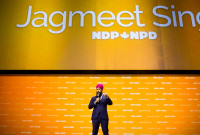Support strong Canadian climate journalism for 2025
NDP Leader Jagmeet Singh says he is proud of the party's election campaign, but also disappointed that more MPs were not elected.
At the first meeting of the NDP caucus since the Sept. 20 vote, Singh told his MPs that, though proud of the party's "tough campaign," he was disappointed that so many candidates came a narrow second.
Singh announced he is appointing Bob Dewar, a veteran NDP political strategist, to lead a review into what succeeded and what went wrong with the NDP's election campaign.
The party gained only one extra seat despite spending $25 million on the election. It was the only major party to increase its share of votes.
Addressing his caucus of 25 MPs on Wednesday, Singh welcomed four new faces, including Blake Desjarlais, the new MP for Edmonton Griesbach, a Metis leader who is the first two-spirit MP.
Singh told his MPs that he was proud of the campaign but was also "acknowledging that there are things that we need to do" and that "there were things that went well and some things that didn’t.”
"We ran a tough campaign and we worked hard," he said. "But we are also disappointed as well."
He said he was disappointed that "there were seats that we were so close to winning," but only came second.
Singh asked his MPs for feedback and input into how the campaign went, nationally and on the ground. He said Dewar, a veteran political strategist, would launch a "really extensive review."
NDP communications director Melanie Richer said the review of how the campaign went is expected to report by the end of the year.
Alexandre Boulerice, deputy leader of the NDP, said the party would “have been happy to have more MPs today” but he was pleased that it had increased its share of votes in the election.
“Maybe we had some issues about getting out the votes but we will discuss that,” he said, before the caucus meeting.
He said the party was “well placed for next time” in Quebec to win more seats.
“We put some really good roots in the ground for next time,” Boulerice said.
Desjarlais said he focused his campaign on “those folks who didn’t have their voices heard” and on getting “the vote out.”
He said he thought the NDP campaign was "phenomenal," adding that "all parties have had a difficult time trying to get out the vote."
The NDP leader also asked MPs for input on policies for the new Parliament, where the Liberals will continue as a minority government.
Singh told his MPs that fighting for Indigenous rights, including good quality affordable housing, combating climate change and pushing for higher taxes for the super-rich will be priorities for the NDP.
Singh signaled he would not use NDP numbers to torpedo Trudeau's minority government.
"Canadians … want to see Parliament work for them. Our goal is never in a minority government to tear down government," he said.
He said that combating COVID-19 and making sure that Canadians had access to paid sick leave were priorities the NDP would continue to push for, as well as a national vaccine passport.
"Having a clear federal document that can be used to prove your vaccination is something we have long called for and seems to make a lot of sense," he said.
The party came a close second in a clutch of ridings, but failed to break through in Quebec or in the Greater Toronto Area, despite favourable popularity ratings for Singh.
During the campaign, he criss-crossed the country, visiting dozens of target ridings, and meeting voters from many different backgrounds.
The review will examine whether Singh's energetic touring campaign worked, and if the party's active social media strategy cut through to floating voters, and different age groups.
It will also look at whether the party should have focused its message more on "bread and butter issues" that appeal to suburban voters who are not aligned to any political party, according to Richer.
It will also examine how voter turnout affected results in close-run ridings.
Singh told his caucus he was "holding out" for the result of a recount in the Toronto riding of Davenport where the NDP candidate lost to the Liberals by 76 votes.
He said "a breakthrough in Toronto" would be welcome.
Karl Belanger, a former senior NDP adviser, said the party would need to improve its messaging and organization on the ground to convert close seconds into wins next time. He said making gains in Toronto and Quebec was key to electoral success.
But, despite gaining only one more MP in the election, Singh would escape a leadership challenge, Belanger predicted.
“I’m not hearing any revolt or anything like that. I am sure people will raise concerns about what happened in the campaign. I think there are going to be questions that Singh was not able to capitalize on his own popularity, and couldn’t break through in the GTA,” Belanger, president of Traxxion Strategies, said.
“They say they ran a good campaign but a campaign that doesn’t deliver seats is not a good campaign. They need to look at the message.”
In 2011, the NDP rode a so-called orange wave, returning the largest number of seats in its history. It formed the official opposition for the first time. In the 2015 election, the NDP won 44 seats, compared to 24 in 2019, Singh’s first campaign as NDP leader.
The caucus of 25 MPs — some of whom wore orange masks, and even orange socks — loudly clapped for Singh as he entered the parliamentary committee room where the caucus was held, and more loudly still when he said he would fight for compensation for Indigenous children.
This report by the Canadian Press was first published Oct. 6, 2021.





Comments